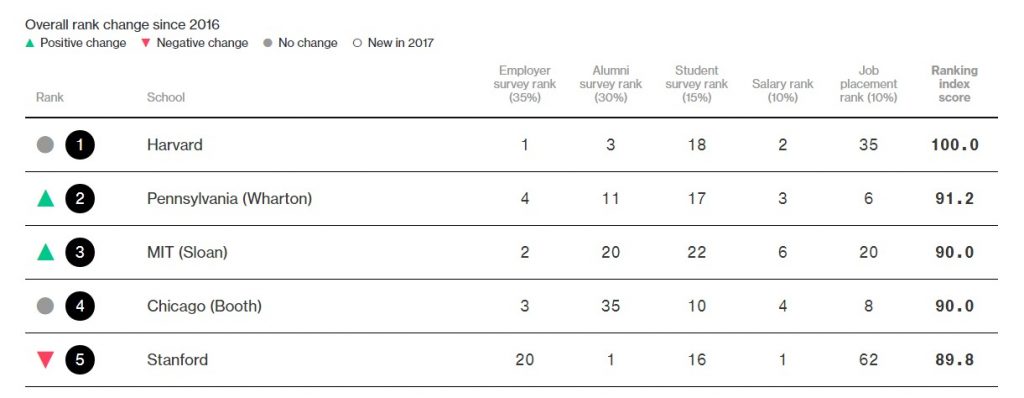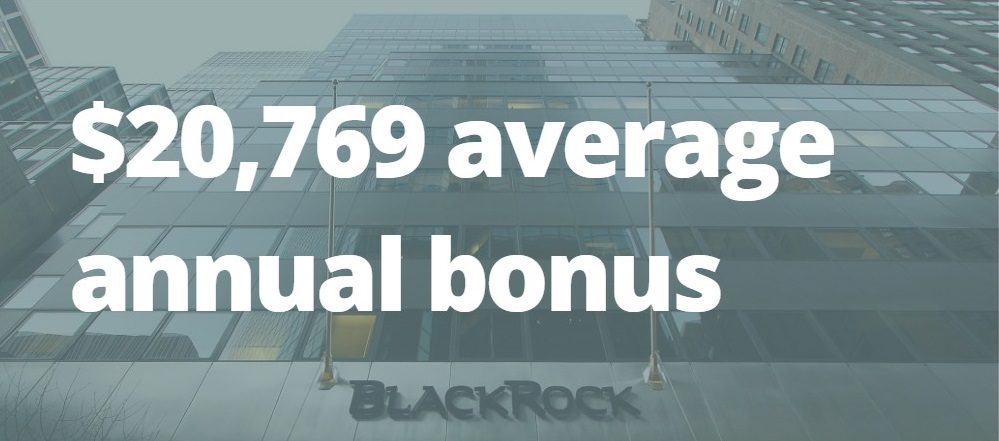Top MBA Programs Gain Ground for Gender Parity

The Forté Foundation today released its annual women’s enrollment report for full-time MBA programs at its member schools, which include many of the top business schools in the United States and abroad. This fall, women’s MBA enrollment climbed to a global average of 37.4 percent, up 4 percent over 2013 figures, when the global average was 33.4 percent women.
In fact, the last five years of enrollment data at Forté member schools reveal steady gains in the percentage of women. For U.S. schools, women’s enrollment reached 37.8 percent this fall, up from 37.1 percent in 2016, and 34 percent in 2013. And for schools outside the United States, the gains have been even greater. In fall 2017, non-U.S. Forté member schools enrolled 36 percent women, up more than 3 percent year over year (from 32.8 percent in 2016) and almost five percent since fall 2013 (from 31.1 percent).
“I’m always heartened anytime I see a 1 percent trend overall,” Forté Executive Director Elissa Sangster told Clear Admit. “Year by year, it’s pretty significant for this group of schools to steadily have that same number increase—because it’s a lot of work to get more women into the pipeline and to matriculate those women,” she continued. “But this year, in particular, seeing those other schools outside the U.S. go up 3.4 percent in one year was very surprising.”
Two Schools Reach 45 Percent Women, Highest on Record
In fact, there were many signs beyond these overall statistics that show continuing progress toward gender parity among MBA programs. For one, 17 Forté member schools this fall enrolled 40 percent or more women—as compared to just two schools that reached this milestone in 2013. A total of 26 schools enrolled more than 35 percent women, more than twice as many as in 2013 (12 schools). Best yet, for the first time ever, two schools reached 45 percent or more women enrolled—the University of Pennsylvania’s Wharton School and George Washington University School of Business. And three more schools—two in the United States and one in the United Kingdom—were close behind at 44 percent.
“The 1 percent [overall year-over-year gain] may seem small, but we’re seeing 17 out of 50 schools hit over the 40 percent mark, and that’s huge,” said Sangster. “To start seeing schools trend that direction makes a big impact because it’s a hard thing to obtain for any school at this point.”
Not only that, the progress demonstrates that gender parity is attainable, Sangster stressed.
“Although women’s enrollment in business school is a slow and steady growth story, at this rate we could reach an average of 40 percent women’s enrollment in top business schools in less than five years and 50 percent by 2030,” she said in a Forté press release. “Why is this significant? There is evidence that an MBA can provide both career advancement and significant pay gains for women, giving them greater economic mobility. And efforts to support women to pursue an MBA can contribute to a more diverse leadership pipeline at companies.”
The Forté Foundation is a non-profit consortium of top business schools, corporations, and the Graduate Management Admission Council, and its efforts to move the needle toward gender parity in the MBA and business more generally are widespread. Launched in 2001 after the results of a landmark research study, Women and the MBA: Gateway to Opportunity, Forté now has 51 member schools: 39 in the United States, four in Canada, and eight in Europe. It also has numerous initiatives to help close the gender gap.
“Our college efforts are very robust and have been growing over the last five years. We are connecting with women about their career options and bringing the MBA into the conversation early,” explained Sangster. “It’s important for women in their university years to really understand what type of opportunities they have, to have access to role models, and to know the landscape of what’s to come. I think Forté can be a real guide in that. We know that having those conversations with young women is critical.”
A few of Forté’s initiatives include
- The annual Forté MBA Women’s Leadership Conference, which brings together hundreds of women MBA students and top companies each year to help attendees explore career paths, meet recruiters and mentors, and hear from influential businesswomen;
- The Forté College to Business Leadership Conference, a similar event designed to introduce undergraduate women to career opportunities and summer internships at top companies;
- The “Rising Star” pilot initiative, launched in September 2015, which helps undergraduate women become well-informed about their many career options, and
- MBALaunch, a hands-on, 10-month program that provides guidance, resources, and ongoing feedback about the business school application process through monthly webinars, peer group meetings, and feedback from experienced advisors.
“MBALaunch allows us to give women unprecedented access to business schools, alumnae, admissions representatives, and admissions experts—and also to give them a cohort of like-minded women who can support them and encourage them through the business school application process,” Sangster said. In the past, many women went through the application process alone, she continued. “MBALaunch allows us to present the best version of those women candidates to business schools. That’s what makes a critical difference in terms of admission into your stretch business school.”
The Forté Foundation also awards a variety of scholarships through its Forté Fellows program. The program has exploded from just 33 inaugural scholarships awarded in 2003 to 1,300 scholarships awarded to the incoming Class of 2017 and another 1,100 scholarships awarded to second-year students in the Class of 2016. Overall, since 2003, Forté schools have awarded a staggering $142 million in scholarships to Forté Fellows.
It Takes an Entire Community Effort
To augment Forté’s initiatives, top business schools can continue to make progress on their own by keeping a steady eye on gender parity and getting the entire school involved in the process, said Sangster.
“The schools that are doing a great job at consistently keeping their numbers high have an entire community effort focused on the goal of gender parity,” Sangster said. “It’s not just the admissions team reviewing applications and making decisions. It’s the students enrolled in the school being actively involved in recruiting and matriculating those students. It’s the alums making phone calls and participating in local coffees or teas to talk about their own story and to reduce concerns about the investment that women will be making.”
“It’s not just one small group of people; it’s a team effort, a community effort,” she continued. “The schools that are maintaining their numbers and seeing a steady climb have a full-court press.”
So which schools are leading the way? The following 17 Forté member business schools have 40 percent or higher women’s enrollment:
- Alliance Manchester Business School
- Columbia Business School
- Dartmouth College (Tuck School of Business)
- George Washington University School of Business
- Harvard Business School
- Imperial College Business School
- Massachusetts Institute of Technology (Sloan School of Management)
- Northwestern University (Kellogg School of Management)
- University of California Berkeley (Haas School of Business)
- The University of Chicago (Booth School of Business)
- University of Michigan (Ross School of Business)
- University of Oxford (Saïd Business School)
- University of Pennsylvania (Wharton)
- The University of Texas at Austin (McCombs School of Business)
- University of Toronto (Rotman School of Management)
- Yale School of Management
- York University (Schulich School of Business
And the following nine schools have 35 percent or greater women’s enrollment:
- Arizona State University (W. P. Carey School of Business)
- HEC-Paris
- London Business School
- New York University (Stern School of Business)
- University of California – Los Angeles (Anderson School of Management)
- University of Cambridge (Judge Business School)
- University of Illinois Urbana–Champaign (Gies College of Business)
- University of Virginia (Darden School of Business)
- Washington University in St. Louis (Olin Business School)
To access the full Forté report, click here.
This article has been edited and republished with permissions from Clear Admit.
How the House Tax Cuts and Jobs Act Could Affect Grad Students

Days before the House of Representatives voted to pass the House Tax Cuts and Jobs Act on the morning of Thursday, November 16, budget experts at the Wharton School at the University of Pennsylvania broke down the proposed bill, discussing its broad potential impact.
The breakdown, per the Wharton Budget Model, focused on three principle findings:
- “This brief reports Penn Wharton Budget Model’s (PWBM) dynamic analysis of The House Tax Cuts and Jobs Act (TCJA), as amended and reported out by the Ways and Means Committee on November 9, 2017.”
- “After including the tax bill’s effects on economic growth, TCJA is projected to reduce revenues between $1.5 trillion and $1.7 trillion. Debt rises by about $2.0 trillion over the same period. Looking beyond the 10-year budget window, by 2040, revenue falls between $3.6 trillion and $4.4 trillion while debt increases by $6.4 to $6.9 trillion.”
- “In 2027, GDP is between 0.4 percent and 0.9 percent higher than with no tax changes. By 2040, the difference between GDP under the House tax bill and current policy is between 0.0 percent and 0.8 percent, due to larger debt.”
The research focused on broader implications, rather than zeroing in on how the bill potentially effects different socioeconomic classes. In conclusion, the research “projects that The House Tax Cuts and Jobs Act reduces federal tax revenue in both the short and long-run relative to current policy. In the near term, there is a small boost to GDP, but that increase diminishes over time.”
Brian Naylor at NPR notes that the bill was passed mostly on bipartisan terms, with Republicans in the U.S. House of Representatives largely pushing it through to the Senate without much push-back. “The vote was almost along party lines, with no Democrats voting in support of the bill and some GOP defections over provisions in the measure that would eliminate important tax deductions taken by constituents in some high tax states,” he writes.
The bill is less likely to pass in the Senate as it did in the House, according to reports from the New York Times. If it were to, however, the new legislation would directly affect graduate students across the board—including MBA students.
Section 117(d) of the bill, which can read here, indicates that all graduate students that receive any kind of tuition waiver will still have to pay taxes on the removed costs. For MBA students at schools like the Tepper School of Business at Carnegie Mellon University, this could mean a year-end cost increase of at least 25 percent, if not more. For students in Ph.D. programs, which often give tuition waivers to help bring in valuable research, the costs can be significantly higher, according to CNBC.
“This makes graduate school unattainable for anybody not already very well off,” 24-year-old grad student Kelly Balmes told NPR. “It also creates a diversity problem, which graduate STEM programs already have.”
Harvard Business School Tops Bloomberg Businessweek Ranking

For the third straight year, Harvard Business School reigned supreme in the annual Bloomberg Businessweek “Best Business Schools” ranking, topping the Wharton School at the University of Pennsylvania and MIT Sloan School of Management. In joining HBS on the medals podium this year, those schools both saw significant gains over last year, climbing from sixth and seventh respectively.
Rounding out the top five this year is the University of Chicago Booth School of Business —holding steady year over year at fourth—and Stanford Graduate School of Business, which fell from second place in 2016 to fifth this year.

The methodology Bloomberg Businessweek uses to arrive at its annual MBA ranking involves weighting each of five principle factors. Employer surveys account for 35 percent of a school’s score. Alumni surveys account for another 30 percent. And a combination of current student surveys, salary rankings, and job placement together account for the remaining 35 percent of the final score.
High Risers
Ten out of the top 20 ranked schools in the 2017 Bloomberg Businessweek ranking advanced at least one spot over last year. Wharton and Sloan each managed to leap four spots, boosted by high praise from employers and hefty salary benefits for recent graduates. The University of Washington Foster School of Business also managed to jump from 19th to 15th overall this year, thanks largely to its top ranking as the nation’s best business school for job placement.
The Cornell S.C. Johnson Graduate School of Management and the UCLA Anderson School of Management both saw a rankings jump of three spots, with Johnson moving up to 13th and Anderson coming in at 19th.
The year’s biggest winner, however, may be the Penn State Smeal College of Business, which jumped a whopping 12 spots from last year’s 37th to come in at 25th in 2017. It wins the award for the year’s biggest overall rankings increase. The USC Marshall School of Business also saw a momentous climb this year, sidling up eight spots from 38th last year to 30th this year.
In the latter half of the rankings came another one of this year’s biggest risers, with the Terry College of Business at the University of Georgia jumping 11 spots from last year, up from 65th overall to 54th. Elsewhere, the David Eccles School of Business at the University of Utah, the Whitman School of Management at Syracuse University, the C.T. Bauer College of Business at the University of Houston, and the Pepperdine University Graziadio School of Business and Management all saw a jump of at least seven spots in the new ranking.
Once Mighty, Now Fallen
Stanford GSB, Duke’s Fuqua School of Business, Dartmouth’s Tuck School of Business, and Jones School of Business at Rice University may all be feeling a wee bit dizzy. Last year Stanford shot up to second from seventh the year before, but this year it finds itself demoted to fifth. Duke’s Fuqua School, which last year celebrated a momentous jump from eighth to third, this year fell back down to seventh. Dartmouth’s Tuck School of Business, which had one of last year’s biggest gains, rocketing up nine spots to break into the top five from a mere 14th place finish the year before, this year finds itself at seventh. Similarly, Rice Business, as the Jones School likes to be called, which last year catapulted 11 spots to number eight, this year slipped to tenth. But at least all maintained their footing within the top 10.
Emory’s Goizueta Business School and the Texas A&M Mays Business School, for their part, slipped out of the top 20 altogether. Goizueta slipped just slightly, from 20th to 21st, and Mays slid from 18th to 22nd. The University of Virginia Darden School of Business also stumbled, slipping from 12th last year to 17th this year. But the Charlottesville school at least managed to remain in the top 20, thanks in part to strong scores in the student survey and salary categories.
No school, however, lost more ground than the George Washington University School of Business, which fell an eye-popping 14 spots from last year, losing its place among the top 50 business schools in the United States.
Bloomberg BW has made multiple changes to its methodology in recent years, resulting in significant volatility in terms of where schools fall on the list even when not much has changed year over year at the individual schools themselves. This has led many to question the credibility of the ranking overall. That said, Clear Admit’s Alex Brown found this year’s results easier to swallow than some in recent years. “This ranking seems more reasonable to me this year,” he says. “Each of the M7 programs are in the top 10, and the schools I would consider in the top 16 are all in the top 20.”
You can view the complete 2017 Bloomberg Businessweek rankings here.
This article has been edited and republished with permissions from Clear Admit.
MBA Job Opportunities: BlackRock

Though many MBA grads are passionate about their career prospects, those driven to work in the financial industry may be more reticent to commit to a life of uncomfortable suits and harsh fluorescent lights. A TINYpulse study found that employees at financial service companies have some of the lowest career satisfaction rates out there, despite stable salaries. The study put the amount of financial service employees who are happy with their work environment at less than 22 percent. In fact, an eFinancialCareers study found that one third of bankers hate their jobs. So, does an MBA and a penchant for finance mean a life of tolerating punishing work hours with little recognition from colleagues and superiors? Not necessarily.
Recent MBA grads with a penchant for finance will be pleased to learn that BlackRock, Inc., one of the largest asset-management companies in the world, provides a different kind of environment from the majority of financial institutions. Business Insider consistently ranks BlackRock as one of the premier financial employers in the U.S, writing, “The firm is big on employee development plans and employee engagement. For example, employees get to pitch ideas to senior executives at the two-day Innovation Summit, which helps spur new products for retirees and connect coworkers across different departments, according to LinkedIn.”
Why Work at BlackRock?
In a Business Insider interview, Jeff Smith, Senior Managing Director at BackRock’s Head of Global Human Resources Group, called BlackRock, “… an incredibly passionate place with a very clear sense of purpose that comes from Larry Fink, our founder and CEO, to everyone else in the company.”
BlackRock is renowned for its relaxed corporate culture, and 73 percent of its employees report high job satisfaction. The company employs over 130 investment teams in 30 different countries, so there is ample opportunity to join BlackRock beyond its New York City headquarters.
BlackRock’s effort to create a successful and diverse environment has been nothing short of empowering. Since 2015, over 2000 of the company’s prominent employers joined in the “Driving Better Decisions” initiative, which aims to help remove “unconscious bias” in decision-making, according to the official BlackRock website, as well as rethink the way human resources recruits and develops diverse talent. While the gender ratio at the company is still predominantly male, BlackRock has also made a concerted effort to increase female employment in senior management roles to 30 percent by the end of the decade, signing the HM Treasury’s Women in Finance Charter.
Pay Day
According to recent PayScale survey figures, MBA grads, despite their role, earn around $86,000 annually at BlackRock. These figures fluctuate depending on the specific role, rising to as much as $316,000 per year for investment strategists. According to the same data, bonuses at the company are also pretty exceptional. Portfolio managers reported an average bonus of $39,000 per year, while even the lowest bonus figures neared $10,000 per year.

Figures according to PayScale data.
Interning at BlackRock
For students nearing the end of their higher education journey, BlackRock offers summer internships for a glimpse of life at the company. BlackRock’s global Analyst Program is a two year-long entry level program for new graduates. The program kicks off with a training in New York City. Throughout the program, trainees will develop their skills in communicating with clients and understanding how to help them manage fiduciary matters.
BlackRock offers several other internships, and is conscious of promoting diversity in their industry. The Founders Scholarship provides merit rewards and a summer internship to students who identify as Black, Hispanic, Native American, LGBTQ, or disabled. Merit awards for this scholarship can be as high as $15,000.
Getting Hired
In an interview with eFinancialCareers, Jonathan Jones, director of global campus recruiting at BlackRock, gave some insight into how interested candidates can get their foot in the door at the company.
“What I think makes a BlackRock person stand out though, is that we look for people who embody or represent our principles. For example, we have a commitment to innovation. Innovation—original thinking, problem solving, and creativity – is central to our identity. Equally, we have a strong commitment to teamwork, and we look for people who can join the dots between our disparate activities in ways which can solve problems for our clients,” Jones said.
According to Jones, BlackRock hires many recent university graduates with Bachelor’s degrees, and the company also hires MBA candidates who have work experience that is relevant to specific positions, such as real estate and equity research.
A recent highlight from Clear Admit on the best business school’s for MBA grads that want to break into the industry that these five schools produced the most finance employees:
- Columbia Business School
- University of Chicago Booth School of Business
- New York University Stern School of Business
- University of Pennsylvania’s Wharton School
- Cornell Johnson Graduate School of Management
BlackRock has been actively recruiting at the world’s high ranking universities, stopping by Columbia Business School as recently as last month for an information session. Read here to find out for more events the company is hosting in the coming weeks and months and check out more about a potential career with BlackRock below.
To Be Out—or Not to Be Out—in Your MBA Application?

In honor of yesterday’s National Coming Out Day, we thought we’d tackle a thorny question faced by some applicants to leading business schools: To be out—or not to be out—in your MBA application? In recent years, increasing numbers of top business schools have given applicants the opportunity to disclose their sexual orientation as lesbian, gay, bisexual, transgender, or queer (LGBTQ) as part of their application if they so choose. But what are the pros and cons of doing so? To find out, we spoke with admissions directors at schools all over the country to get their input.
The overwhelming consensus, we found, was that there are multiple positives and few, if any, negatives to sharing your sexual orientation as part of the application process provided you feel comfortable doing so. This is not to say that anyone should feel pressured to disclose anything that they are not personally comfortable sharing—just that those who feel inclined to share shouldn’t have any hesitation from an admissions standpoint.
“I Really Only See Pros”
“I really only see pros,” says Soojin Kwon, managing director of full-time MBA admissions at the University of Michigan’s Ross School of Business. “We are always encouraging applicants to be very authentic and bring their whole selves so that we have context around them. We are a very diverse and inclusive community, and we want to know every aspect of who you are and what you’ll bring to that community.”
Applicants who do disclose LGBTQ status—or even those who don’t—also can indicate that they would be interested in hearing from students in the school’s Out for Business student club, which helps prospective students get tapped into the campus LGBTQ community well before they arrive on campus. “Our current LGBTQ students absolutely reach out, embrace, and actively engage with applicants who self-identify because they want to make sure that our community is very strong on every aspect of diversity—they are very proactive,” Kwon says.
NYU Stern School of Business Associate Dean of MBA Admissions Isser Gallogly stresses that whether or not to disclose sexual orientation is a personal choice that should be based on each individual’s comfort level. “But certainly at NYU Stern—in New York’s Greenwich Village—we are obviously incredibly diverse and supportive of diversity,” he says. The LGBTQ rights movement can trace its origins to the neighborhood surrounding Stern, and a community of acceptance has prevailed there for decades.
“It Might Present Certain Advantages”
But even beyond Greenwich Village and Stern, Gallogly tells LGBTQ applicants that they shouldn’t have concerns about being out in the MBA admissions process. “Business schools are looking for diversity—we as admissions officers are always looking for different vantage points and perspectives that applicants can bring to the class. I think anything that’s a little different or unique only helps your personal story,” he says. “I don’t think there’s any disadvantage to being out in the admissions process, and, in fact, it might present certain advantages.”
Self-Identifying Is First Step to Qualifying for LGBTQ MBA Fellowship
Indeed, students who self-identify as LGBTQ at certain schools will automatically be considered for scholarship aid through the Reaching Out LGBTQ MBA (ROMBA) Fellowship Program. ROMBA is a nonprofit organization dedicated to “educating, inspiring, and connecting the student and alumni LGBTQ MBA and graduate communities in an ongoing effort to create the next generation of out business leaders.” Recipients of the LGBTQ MBA Fellowship each receive a minimum of $10,000 in scholarship aid per academic year or $20,000 in total scholarship aid for two years. In addition, they get access to exclusive mentorship and leadership programming through ROMBA. Fifty-five members of the Class of 2019 will collectively receive more than $1,300,000 for each year in business school, ROMBA reports. “Since 2015, 35 schools have awarded $6.3 million to LGBTQ applicants who were out on their applications,” adds Matt Kidd, ROMBA Executive Director.
Beyond self-identifying through a school’s application form, applicants interested in being considered for the ROMBA fellowship are encouraged to demonstrate LGBTQ leadership roles on their resume, express interest in business schools’ on-campus LGBTQ clubs, and share relevant LGBTQ leadership experiences in their application essays.
YOU MIGHT ALSO LIKE: This Year’s Reaching Out MBA LGBTQ Conference Arrives in Boston
Prem Tumkosit, a 2011 MBA graduate from Yale School of Management (SOM), didn’t explicitly disclose his sexual orientation on his MBA applications. When he was applying, that option was provided by fewer schools. “But I did list my participation and leadership positions in LGBT organizations, which I felt was essentially disclosing,” he says.
Gallogly adds that current students are frequently shocked and surprised—once they begin the recruiting process—by how many corporations are likewise looking for diversity, including in sexual orientation. “The short story is if you feel comfortable, I would go for it [disclose sexual orientation], because you will see opportunities to receive support,” he said. “Short story: It’s a good thing.”
Opt in to Get Connected to On-Campus Groups
Bruce Delmonico, Assistant Dean and Director of Admissions at Yale SOM, says that his team considers it so much a positive that he sometimes has to stop and remind himself that some applicants might actually wonder if it could be viewed as a negative. “We consider it an aspect of diversity, so we certainly don’t see any negative in it,” he says. As at Ross—and many other schools—Yale SOM also allows applicants to opt-in to receive communication from LGBTQ students and groups, which helps facilitate valuable connections both during the application process and in the months leading up to school’s start.
“I really don’t see any negatives to it,” Delmonico continues. “People sometimes choose not to disclose, and obviously that is fine—it’s everyone’s individual choice,” he notes. “It can still be a difficult thing—and people are at different stages in terms of their own self-identification—so it is not as though not sharing is viewed negatively. But it is an aspect of diversity that we think about as we are trying to put together our class, so we view it as a positive.”
Delmonico does share that Yale has seen an increase in the number of people self-identifying as LGBTQ. “I think that’s a good thing,” he says, “but we do want to make sure people are being accurate in self-reporting,” he adds. Especially outside of the United States, he worries that not everyone knows what it means to identify as LGBTQ.
Don’t Self-Identify as LGBTQ If You’re Not LGBTQ
“We also sometimes have to wonder if some candidates might be looking to game it a little bit,” he says. “That’s something we are starting to be sensitive to. We look at it as a positive—but we don’t want people just checking the box because they think it might give them a little boost over other applicants.” To offset potential gaming of this system, his team has begun to dig a little deeper to see what being LGBTQ means to those who check the box. “It’s not something we would ask about in an interview,” he stresses, “but we will look to see what else they might have shared” that might support their LGBTQ status. “It can be helpful, if you are self-reporting, if you share some way you are expressing that already,” he says. For example, some people write about LGBTQ themes in their essays or talk about related groups they’ve been part of, he says.
Amanda Carlson, Assistant Dean of Admissions at Columbia Business School, shares that her team also saw an uptick in self-reporting among applicants for the Class of 2019, particularly from certain regions. “I am saying this somewhat tongue and cheek,” she notes, “but it’s like some admissions consultant told candidates in China that saying you are part of the LGBTQ population is a good thing, because I think every single Chinese candidate this year checked the box.” Of course, she met personally with Chinese candidates who were quite genuinely members of the LGBTQ community, she adds, but she also wonders if there was some confusion among some applicants about what LGBTQ means.
“At the same time, we recognize that there is an appeal to being in New York—where people rightly feel that being LGBTQ is a warm and accepted thing—where it may not always be in China,” she notes.
Is LGBTQ Inclusive Enough?
Maryellen Reilly, deputy vice dean of admissions, financial aid, and career management at the University of Pennsylvania’s Wharton School, echoes what other admissions directors have said, adding that for some students it can also be liberating. “Some students may not have been out in high school or college and it can be liberating to share it as part of applying to business school—to get to say, ‘Here I am—this is who I am,’” she says. “It’s one less thing you have to worry about hiding at school.” As for a con to self-reporting, “I kind of don’t know that there is one—I can’t think of one,” she says.
Reilly remembers the process that her team went through when they first started thinking about adding the opportunity to self-identify as part of the application. “Did you know that Facebook has 50 different categories around sexual orientation?” she asks. She didn’t. “My mind was blown.” One of the students championing the cause argued that Wharton needed to include all 50. “It’s a spectrum—and we did a lot of learning from an admissions perspective,” she says. “Our LGBTQ community was really strong and vocal, and meeting them where they are required some give and take on both sides,” she says.
So far, her team hasn’t seen any candidates that it thinks might be trying to gain an unfair advantage by claiming to be LGBTQ when they aren’t. “We haven’t seen anything remotely like that—that’s a bridge we’ll cross when we get there, should we get there.”
Jennifer Redmond, a 2016 Wharton MBA graduate, did NOT disclose as part of her application that she is LGBTQ although the option was available when she applied. Prior to business school she worked in London in finance and hadn’t been open about the fact that she identified as a lesbian at work. “Being in Europe, I was reluctant to come out and potentially not have a great reception,” she says. That hesitation carried over to her MBA applications. “In retrospect, my advice to prospective applicants would be that you can tick that box,” she says. “It is completely confidential, and it’s a good way to get looped into all the activities that are available to members of the LGBTQ community.”
Redmond would later attend a welcome weekend at Wharton, where the Out4Biz student club hosted welcome drinks. “It was one of the biggest parties of the weekend, and it became clear to me that the LGBTQ community occupied a very central part of life at Wharton,” she says. “That ended up being a big part of my decision to attend.” When she did move over from Ireland to attend pre-term at Wharton, her roommate was gay and HAD ticked the box. “He was so much more looped into things than I was to start—it made me a little rueful I hadn’t ticked the box myself,” she says.
This article has been edited and republished from Clear Admit.
Social Impact MBAs: Programs That Help Students Make a Difference in the World

For years, social impact has been a growing area of emphasis at business schools. Increasingly, MBA students are stating that a well-paying career isn’t enough: They also want to make a difference.
As Sherryl Kuhlman, the managing director of the Social Impact Initiative at the University of Pennsylvania’s Wharton School, told U.S. News & World Report: “Our students want to make the world go round in a different way. [They are no longer willing to] take a job they don’t like so they can give their money away later. They want to merge the money and the purpose.”
MBA programs incorporate social impact into their programs in various ways, through global experiences, coursework, clubs, competitions, and more. MBA students may also have opportunities to team up with corporations, government agencies, and nonprofit organizations to get hands-on experience during their graduate studies.
So if you’re interested in social impact, what opportunities should you look for within an MBA program?
Centers and Initiatives
Some schools run entire centers and initiatives dedicated to the idea of social change. Typically, these centers provide the foundation around which a variety of social impact opportunities are built, including research, career help, events, and course development.
For example, the McCombs School of Business at UT Austin recently launched its Social Innovation Initiative, which provides students, faculty, and the community with preparation to promote social change. The initiative offers graduate-level curricular offerings, with courses such as “Energy Technology and Policy” and “Invisible Global Marketing.” There are also many extracurricular activities such as the Social Impact Investment Fund, a peer-created fund that provides financial support for MBA students pursuing internships in the social impact space.
“The creation of the Social Innovation Initiative is a crucial step in bringing UT’s overlapping communities together to collectively address the world’s most pressing challenges,” Dr. Meeta Kothare, managing director of the initiative, said in a press release. “The interdisciplinary nature of the initiative is key because the most impactful social innovations often result from collaborations among private, public, and social sectors.”
At Stanford Graduate School of Business (GSB), the Center for Social Innovation aims to bring about social and environmental change through research, education, and experiential learning opportunities. For MBA students, the center offers social innovation courses, study trips, the potential to participate in an investment committee, and fellowships to provide leadership opportunities. The school even hosts an annual ceremony each spring drawing together a tight-knit core of students, faculty, and alumni who share a commitment to social innovation. Three classes of awards are handed out to a dozen students at the event, and Dean Emeritus Arjay Miller, 101, attends to encourage the continuation of a community of social innovation he helped found at the GSB while dean from 1969 to 1976.
Then, there’s the Yale School of Management Program on Social Enterprise. This initiative supports faculty, students, alumni, and practitioners in their pursuit of using business skills to achieve social objectives. It does this by offering a span of programs including courses such as “Global Social Enterprise” and “Managing Sustainable Operations,” as well as research, conferences, and publications. For extracurricular activities, students can participate in the Social Impact Lab, a weekly forum with opportunities to engage with industry leaders and each other, as well as the Economic Development Symposium, an annual conference that brings together eminent scholars, action agents, and key opinion leaders to work on solutions to pressing economic development issues.
Programs
For many business schools, social entrepreneurship is offered part and parcel with their MBA degrees. These programs can range from a one-week social enterprise trip overseas to a formal concentration within the MBA program.
At Northwestern University’s Kellogg School of Management, MBA students can elect a Social Impact pathway concentration. This pathway is designed for students who want to create positive social change and includes required courses on a variety of topics from “Leadership and Crisis Management” to “Public Economics for Business Leaders” and “Health and Human Rights.” Within the pathway, there are three tracks: policy, nonprofit, and social innovation, each offering in-depth coursework to position students for their desired careers.
Meanwhile, MBA students at Emory’s Goizueta Business School can explore social impact through an annual seven- to 10-day Social Enterprise @ Goizueta Trip. These trips take students to countries around the world to observe the challenges that local economies face and develop market-based solutions. Alumni and evening MBA students can also travel to Nicaragua to visit coffee farms and meet growers. Full-time MBA students can visit Nicaragua or El Salvador to explore social enterprises on the ground and work on community health projects.
Competitions
Some schools offer hands-on experience in social impact to their students in the form of social venture competitions.
Through Harvard Business School (HBS)’s Social Enterprise Initiative, which aims to educate, inspire, and support leaders across all sectors to create social change, MBA students can participate in the New Venture Competition (NVC). The competition offers participants a grand prize of $50,000 as well as workshop opportunities, feedback, and business plan development advice.
Designed for students and alumni interested in using their business skills to create innovative approaches to tackling social problems, the Social Venture Competition at NYU Stern School of Business is similar to that of HBS’s NVC. Over the last 11 years it has awarded more than $900,000 to startup social ventures developed by students.
Clubs
Net Impact is one of the most popular social impact clubs, with chapters across the globe. More than 100,000 individuals have joined more than 300 chapters across the world to take on social challenges, protect the environment, and orient business toward social impact. The Net Impact chapter at UCLA Anderson School of Management, for example, has been awarded Gold Status, which recognizes it as a high-performing chapter and qualifies it to serve on the national Net Impact advisory board.
One of highlights of Net Impact is the annual Net Impact Conference, which welcomes attendees from across the globe to hear from keynote speakers, such as Clif Bar CEO Kevin Clearly and Derreck Kayongo, the CEO of the Center for Civil and Human Rights. Attendees at the Net Impact Conference can also take part in a variety of workshops, panels, and boot camps on topics ranging from civic engagement to equity.
In addition to Net Impact chapters, many MBA programs also offer their own social enterprise-focused student organizations. For example, the Social Enterprise Club at Columbia Business School connects students with faculty, alumni, professionals, and organizations to develop business skills and create social, environmental, and economic value.
Scholarships
At Oxford Saïd Business School, MBA students have the opportunity to apply for the Skoll Scholarship, a competitive award for students pursuing entrepreneurial solutions to urgent social and environmental challenges. The scholarship provides funding as well as opportunities for the award winners to meet and interact with world-renowned entrepreneurs, thought leaders, and investors. To qualify, an applicant must have three years of experience in social enterprise and be an incoming MBA student.
At Duke’s Fuqua Business School, there’s the CASE Social Sector Scholarship for incoming daytime MBA students. Scholarship recipients receive at least 25 percent tuition support as well as funding from the CASE Summer Internship Fund. Incoming MBA students who can demonstrate their commitment to applying their business skills in the pursuit of social impact are eligible to apply.
This is far from an exhaustive list—rather it’s a sampling of the wide-ranging opportunities to study social impact across MBA programs around the world. We hope it can provide a jumping off point as you begin to investigate social impact opportunities at your target schools.
